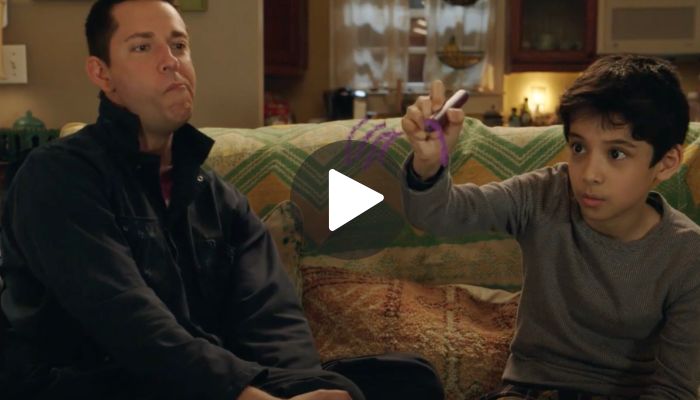
It is common that most actors will mention doing one or two family films so as to make a movie that their children would also enjoy. On the other hand, film producers often specialize in this kind of art, making them famous directors and scriptwriters who can help come up with a code for family entertainment. Given these facts, why are they some children’s productions that have little or no relationship with actual kids?
John Krasinski’s idiotic but sincere earlier fantasy about imaginary friends taken out of context as if they were character names from preschool books on friendship. The new Harold and the Purple Crayon released last week was adapted from Crockett Johnson’s classic. The main child, Benjamin Bottani’s Melvin, is probably almost middle-school age but he still talks seriously about his invisible dog whom he says goes everywhere with him. It is supposed to be related to the loss of Mel’s dad; however it turns out like before in If?, such gestures are rather red flags for authors’ untruthful notions on how kids experience sorrow.
Terri (Zooey Deschanel) hints at Mel trying to make some real friends for once. However when he first meets them Harold (Zachary Levi)—a 2D cartoon character lifted straight from Johnson’s illustrations—takes an alternative approach by choosing to indulge Mel’s belief in his imaginary pet. We might infer that henceforth Levi effortlessly develops his playful connection which no other grown-up appears capable of understanding: but he plays Harold too admirably “for laughs,” thus leaving open the possibility that Harold himself is simply an overenthusiastic sharer of whatever delusions happens around him.
How old was Harold meant to be? –some readers may speculate upon opening any comic book or its sequel— Is Harold- like –just a baby? In essence, yes: a younger version of Baby Blobby who has all the powers of creativity at his command that one would expect from a preschooler’s drawing materials. Harold becomes an adult sort of in the film, just barely, morphing into an animated version of himself with his imaginary animal friends Moose (Lil Rel Howery) and Porcupine (Tanya Reynolds), to whom an off-screen narrator delivers solace. The animals turn humans in as much as they have now become real by exiting the world of cartoons but it is still possible to draw anything using the magic crayon thus disrupting Mel and Terri’s lives for unknown reasons. (In addition, there is also a subplot where Porcupine gets separated from the others.) At some point in time, the movie knew that there should a lesson somewhere here so it chose somewhat randomly between “be yourself” and “imagination is good”. Why? A child who needs friends can only be advised to be themselves
Hardly anything in Harold and the Purple Crayon works. The characters don’t even make sense in terms of dream-believability. In this movie, Reynolds pulls off a good performance. He looks and behaves like a person but talks about being a moose throughout the movie except for some scenes where he momentarily transforms into a CGI moose just to add more noise. The plot heavily relies on the characters annoying service providers, and partly driven by opportunistic brand tie-ins; for example, one section of the film is set at Ollie’s, the American discount chain where Terri works. She hates her job but other characters keep saying that “this place has everything!” Dark-looking visual effects pieces often have individuals getting onto different crayon-made methods of transportation while shouting out how great or terrifying it is. A selfish librarian (Jemaine Clement who revives his pompous-author routine that by now is way passé) makes up Crockett’s nemesis.
Carlos Saldanha directed this film having been an animator for several years with Blue Sky Studios until it collapsed recently after creating Ice Age series which attracted huge audiences across the globe however all those films’ paroxysms vanish into thin air here. Levi as always though is most nebulous: his take on Shazam had moments when he played an adult body trapped inside an angry teenager’s soul only sometimes coming down to a ranting kid mentality; however, now it is entirely made up of such things exclusively screaming upon entry before shifting within minutes between complete sophistication and childishness all to be spitefully misdirected at Terri herself for finding herself with real-world problems whilst she attempts to deal with them via passive aggressive means all through her roles as Harold’s father but these are masked behind expressions twisted with pleasure during fall-out sessions that can easily pass as exercise tapes because no single lead role ever portrayed this level of exhaustion right from beginning till the end of a movie.
All in all, Levi makes an airtight case against Harold being aged into a childlike adult in the first place – what exactly was the point, if not to rehash some shtick that the filmmakers must have eventually realized wasn’t as beloved as they had presumed? It is probably safe to say that this combination of Deschanel and man-child is meant to remind one of Will Ferrell’s Elf-like Christmas comedy only for Will Ferrell to be hilarious instead. As for Harold and the Purple Crayon, it just isn’t funny or insightful about children and takes up much more time and money than simply reading the books it tries making into a metatext. It turns imagination into a gaudy obstacle course.
Watch free movies on Fzmovies